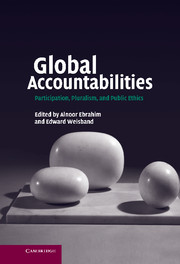Book contents
- Frontmatter
- Contents
- List of tables
- List of figures
- Acknowledgments
- List of contributors
- 1 Introduction: forging global accountabilities
- Part I Public accountability: participatory spheres from global to local
- Part II Experiments in forging NGO accountability: mutuality and context
- Part III Reflective accountability: new directions for participatory practices
- Part IV Global accountability frameworks and corporate social responsibility
- 11 Financial actors and instruments in the construction of global corporate social responsibility
- 12 Public accountability within transnational supply chains: a global agenda for empowering Southern workers?
- 13 Tripartite multilateralism: why corporate social responsibility is not accountability
- 14 Conclusion: prolegomena to a postmodern public ethics: images of accountability in global frames
- Index
- References
12 - Public accountability within transnational supply chains: a global agenda for empowering Southern workers?
Published online by Cambridge University Press: 22 September 2009
- Frontmatter
- Contents
- List of tables
- List of figures
- Acknowledgments
- List of contributors
- 1 Introduction: forging global accountabilities
- Part I Public accountability: participatory spheres from global to local
- Part II Experiments in forging NGO accountability: mutuality and context
- Part III Reflective accountability: new directions for participatory practices
- Part IV Global accountability frameworks and corporate social responsibility
- 11 Financial actors and instruments in the construction of global corporate social responsibility
- 12 Public accountability within transnational supply chains: a global agenda for empowering Southern workers?
- 13 Tripartite multilateralism: why corporate social responsibility is not accountability
- 14 Conclusion: prolegomena to a postmodern public ethics: images of accountability in global frames
- Index
- References
Summary
In recent years, one of the central claims promoted by critics of “globalization” has been that the existing system of global economic governance is being undermined by the emergence of “accountability deficits.” According to this widespread view, the expanding power of multinational companies to influence the lives of workers in the global South, in the absence of adequate accountability mechanisms, is leading to increasing exploitation of Southern workers. Partly in response to such perceptions, a range of non-state actors have begun to explore new strategies that attempt to hold companies within transnational supply chains directly accountable for their impact on the lives of workers. In this context, both the seriousness of existing accountability deficits, and the effectiveness of non-state initiatives designed to confront them, remain the subject of widespread debate.
This chapter presents an analysis of these debates with reference to a case study of workers in Nicaraguan garment factories, and the production chains that connect them into the global structures of the garment industry. It maps current changes to institutions of governance and accountability within the garment industry, and evaluates the impact of these changes upon the “empowerment” of Southern garment workers. The garment industry offers an ideal case for exploring transformations of public accountability within transnational economic structures, since it is both extensively globalized and highly politicized.
- Type
- Chapter
- Information
- Global AccountabilitiesParticipation, Pluralism, and Public Ethics, pp. 252 - 279Publisher: Cambridge University PressPrint publication year: 2007
References
- 11
- Cited by

